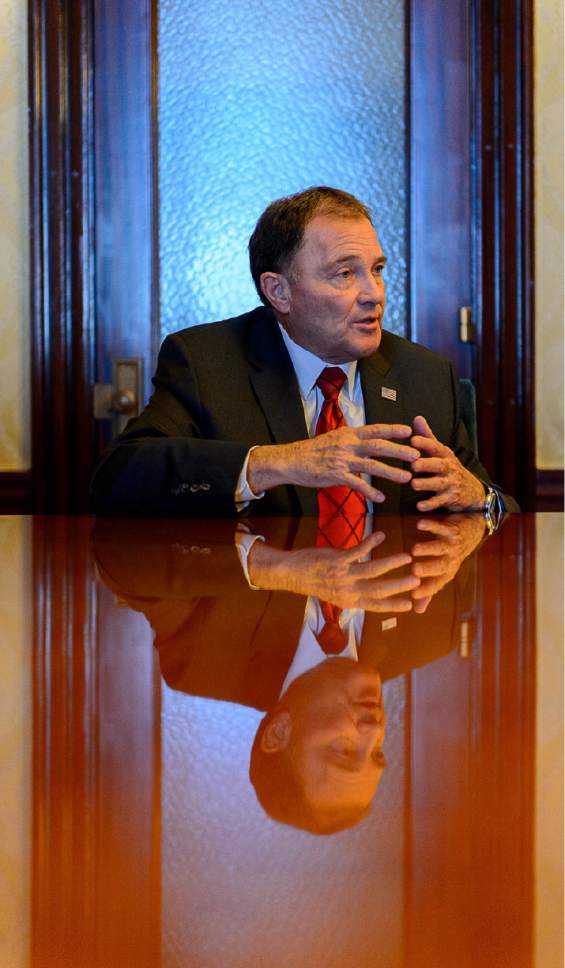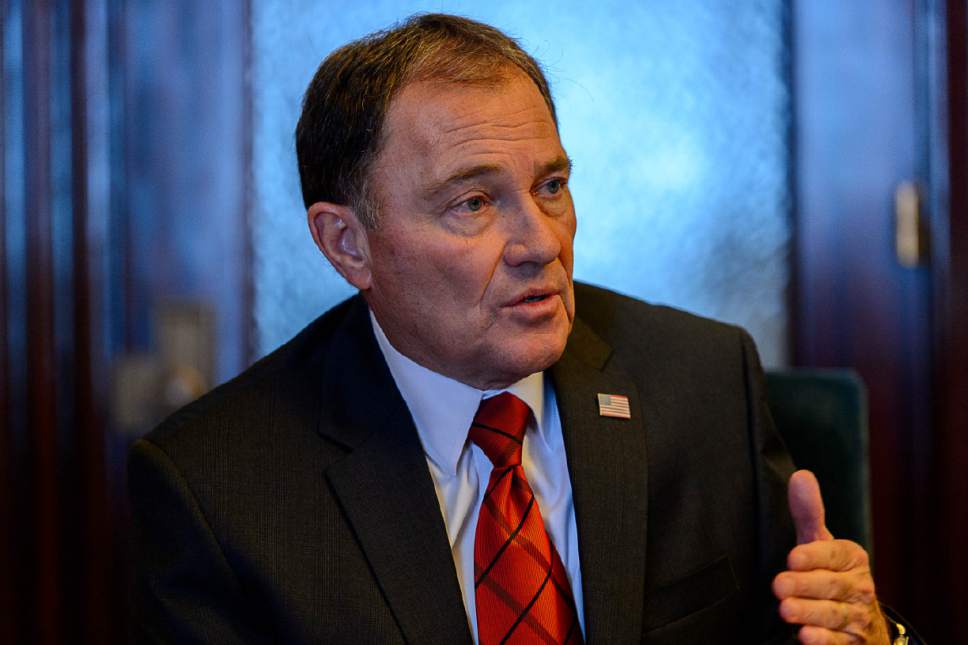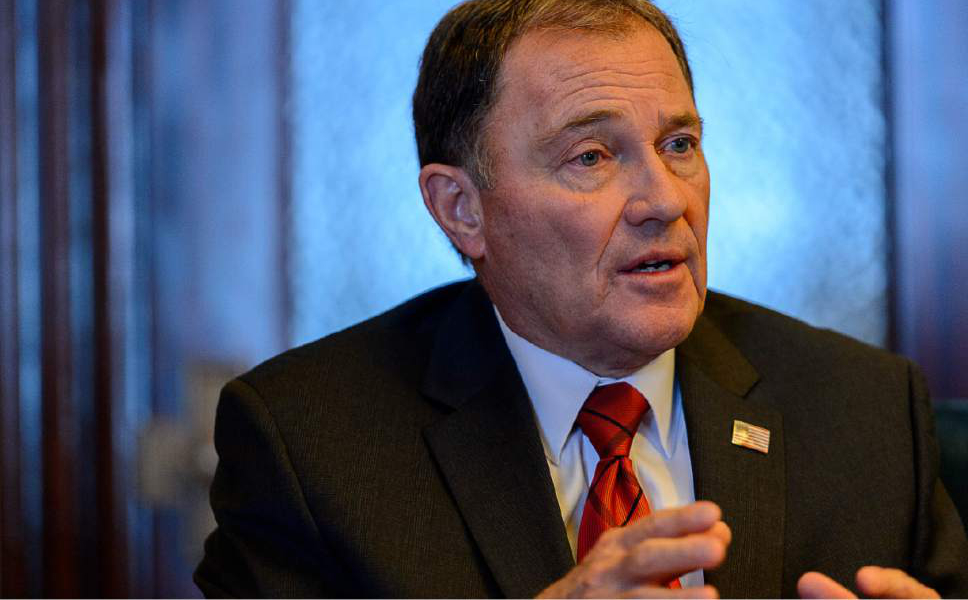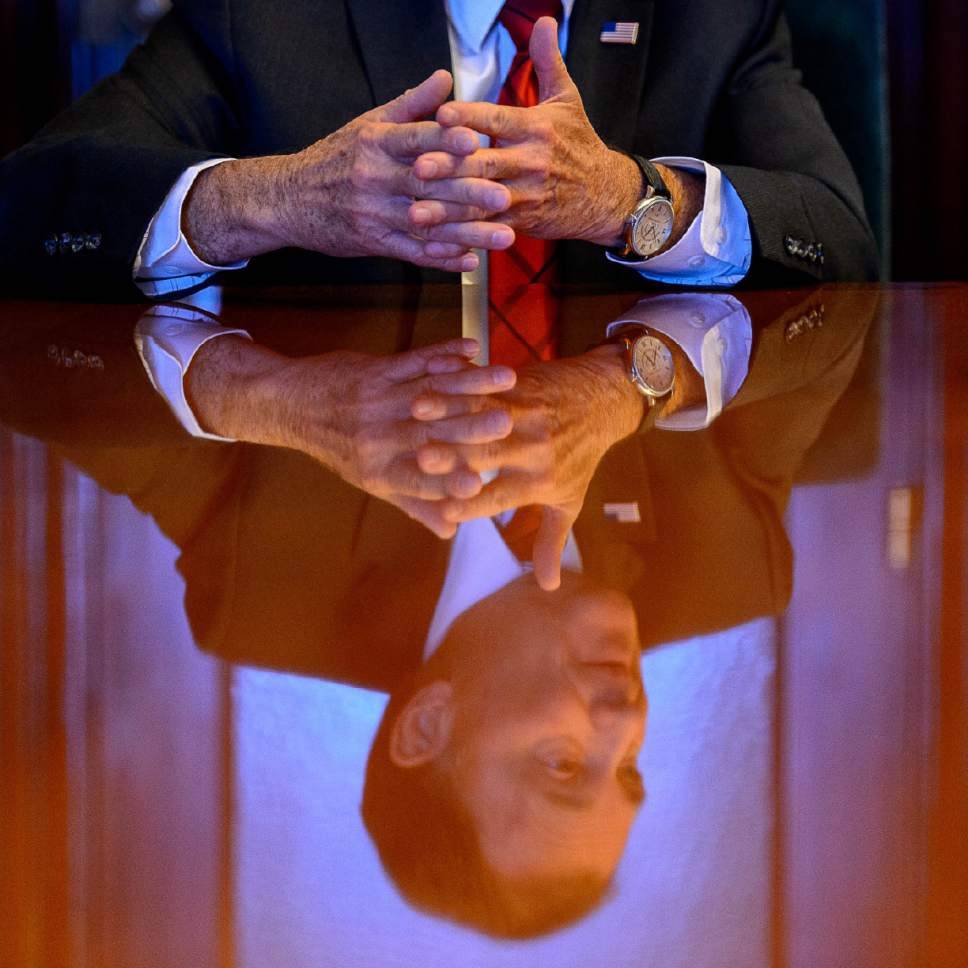This is an archived article that was published on sltrib.com in 2016, and information in the article may be outdated. It is provided only for personal research purposes and may not be reprinted.
A Donald Trump administration in the White House means it will be an opportunity for Republicans to be "playing offense," according to Utah Gov. Gary Herbert.
That translates to giving states more control in setting policy; attaching fewer strings to federal education, transportation and health care dollars; and working more cooperatively on the management of public lands, Herbert said, as the GOP governor looks forward to four more years in office — the first time he will be working with a Republican federal administration.
"We can be a lot more proactive now in getting things done," the governor said in an interview. "I think [Republican governors] are all optimistic [about] having somebody who is a Republican in office in the White House, who understands more appropriately the role of the states and trying to devolve authority back to the states out of Washington, D.C."
Herbert said states can administer programs more efficiently than the federal government, and tailor them to meet specific demographic and economic needs.
That was the message Herbert delivered to Vice President-elect — and, for the time being, fellow governor — Mike Pence when they met recently and Herbert pushed for giving money back to the states in block grants.
"Don't take the money from us in the first place. We don't need any new programs. We don't want any new programs. In fact, we'd prefer that you shrunk the programs," Herbert said, recounting his conversation with Pence. "Second, when you take the money for programs that already exist, you've got to block-grant the money back to us and give us maximum flexibility."
Block grants would give governors and legislators wide latitude to spend the money as they see fit. Herbert said that could translate into a 15 percent savings on road and highway projects, more money making it to classrooms, and huge improvements in providing health care to low-income residents.
"We could solve most of the health care issues if the moneys were block-granted to the states rather than the one-size-fits-all mentality that comes out of Washington," Herbert said.
House Minority Leader Brian King, D-Salt Lake City, said Herbert's confidence in Trump may be misplaced. The president-elect has reversed himself or backed away from bread-and-butter campaign promises — such as building a wall on the U.S.-Mexican border.
"Nobody knows what Donald Trump stands for," King said. "I'm skeptical there's much of anything that the Republican Party has stood for in the past that is necessarily something that Donald Trump is going to do."
Take balancing the budget, a longtime priority for Republicans. Trump has committed to a major federal investment in the nation's highways and bridges. He has also pledged significant tax cuts.
"I don't see how in the world that is going to be accomplished," King said. "Talk about smoke and mirrors."
The nonpartisan Committee for a Responsible Federal Budget projected Trump's campaign proposals would add $5.3 trillion to the federal debt during the next decade.
The governor sidestepped a question about whether a Republican in the White House and the prospect of a GOP-appointed Supreme Court justice would increase the chance that Utah would pursue a lawsuit to demand Congress relinquish control of 30 million-plus acres of federal land within Utah's borders.
Instead, he said, there is an opportunity to find a legislative solution to the public-lands issue through the Public Lands Initiative, legislation sponsored by Reps. Rob Bishop and Jason Chaffetz aimed at settling long-running disputes over millions of acres, but criticized by environmentalists as failing to protect sensitive areas.
The governor said he is interested to see who will lead the Department of Interior and Bureau of Land Management, which oversee most of the public lands in the state.
"I expect we'll find people that understand the uniqueness of public lands here in the Intermountain West, where most of the public lands reside and it's not just some kind of theory," Herbert said. "I think we'll have an easier time, obviously, working with a Republican administration."
Closer to home, Herbert is preparing for what he has said will be his final four years as governor, but hesitated to call his election win a mandate.
"I guess other people can define whether it's a mandate or not," he said. "I just know I won by 38 points and I won by 44 points in the primary, so I think we certainly have the vast majority of people of Utah who like what we've been doing and what we've done and what we've accomplished and expect some more of the same going forward."
He is putting the finishing touches on his budget proposal for the coming year and is scheduled to release it next week. He said his focus will be on continuing to expand the economy and placing "a renewed emphasis on education," with a goal of making Utah's schools the best in the nation.
"It's doable," he said, "and I think if we start pulling together and [there is] less infighting, I think we can accomplish that goal."
That doesn't mean he'll look for a tax increase that would direct more money to schools. Instead, he said, if the state's economy continues to grow faster than inflation, Utah's per-pupil spending will rise, although he acknowledges it will take time.
This year, an estimated 10,089 additional students will mean the Legislature and governor will have to come up with between $70 million and $115 million just to maintain its current per-pupil spending.
Twitter: @RobertGehrke









